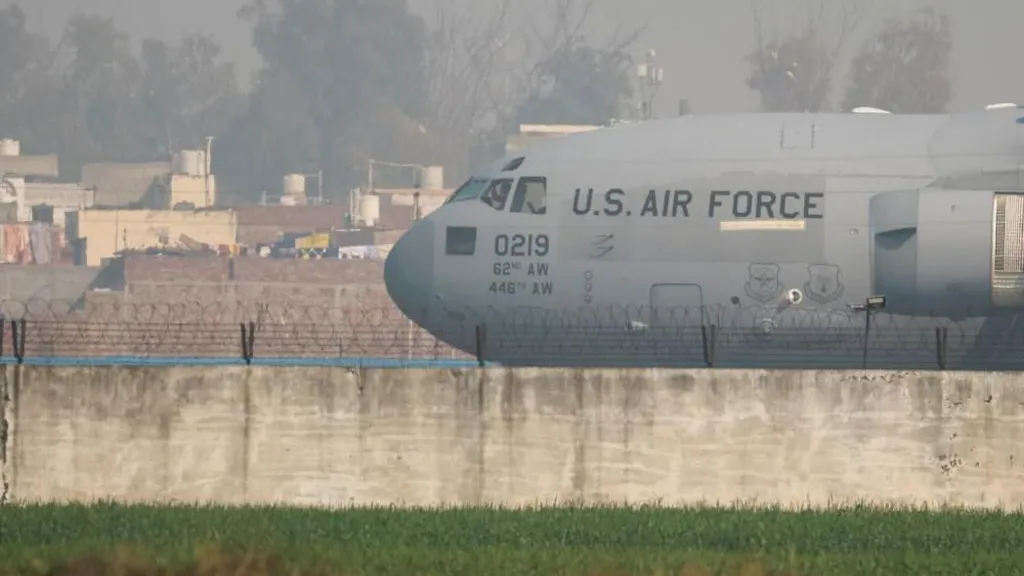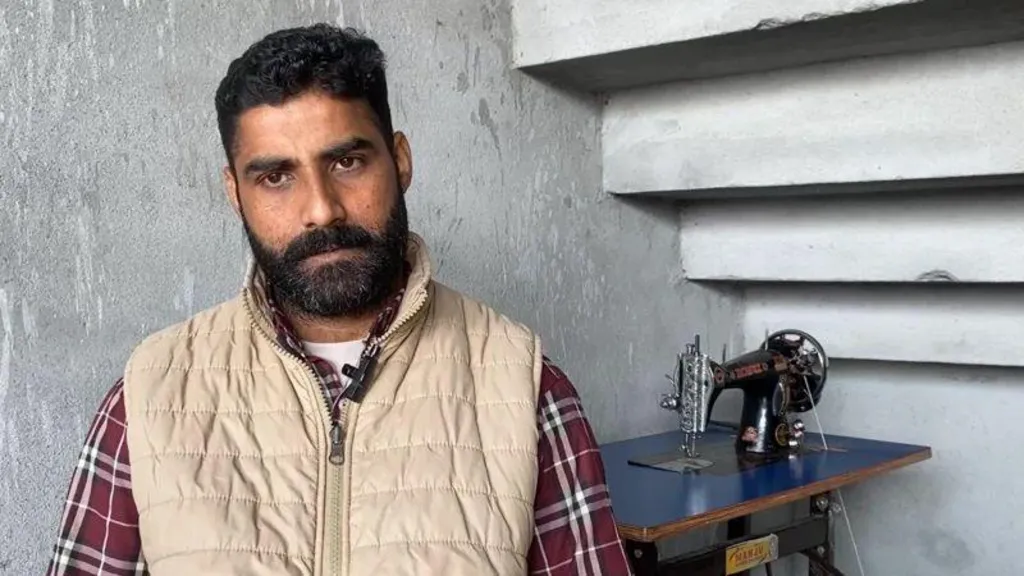India 'engaging with US' after shackled deportees spark anger

By Cherylann Mollan | BBC News, Mumbai
In a tense and controversial moment for Indian foreign relations, India’s Foreign Minister, S. Jaishankar, recently addressed the concerns that have emerged following the deportation of 104 Indian nationals from the United States. The deportees were allegedly shackled for the entire duration of their flight back to India, igniting a storm of criticism and diplomatic tension between the two countries. This controversy has cast a spotlight on the treatment of deportees, human rights during forced returns, and the broader migration issues at play.
The event took place on a US military flight, which landed in Amritsar, Punjab, on Wednesday. The plane was carrying individuals who had been accused of entering the United States illegally and had been detained for months, awaiting deportation. Among the deportees was Jaspal Singh, who spoke candidly about the shocking conditions of the flight. Singh described the harrowing 40-hour journey as one of physical and psychological torment, where he and his fellow deportees were restrained by handcuffs and shackles the entire time. The journey, which took them across multiple stops, was only punctuated by brief moments when they were unshackled after landing in Amritsar.
Singh’s account revealed a shocking level of inhumanity. “We were tortured in many ways,” he said, recounting how he felt powerless, restrained like criminals despite being citizens of India. “My hands and feet were tied after we were put on the plane,” he added, his voice echoing the deep distress that many of the deportees felt. Though the US government did not immediately respond with further details, the images of shackled bodies on the plane have left a mark of indignation across both nations.
A Diplomatic Crisis Unfolds
 This deportation, though not an isolated incident, has sparked serious diplomatic discussions. Jaishankar’s public statement tried to temper the anger of the Indian people, reassuring Parliament that the Indian government was actively engaging with the US to ensure that its citizens were not mistreated during the deportation process. According to the Foreign Minister, India had received assurances from the US Immigration and Customs Enforcement (ICE) that only those who were considered a flight risk were shackled. Furthermore, he mentioned that the restraint procedures for women and children were not as severe, with ICE informing the Indian government that such individuals were not restrained.
This deportation, though not an isolated incident, has sparked serious diplomatic discussions. Jaishankar’s public statement tried to temper the anger of the Indian people, reassuring Parliament that the Indian government was actively engaging with the US to ensure that its citizens were not mistreated during the deportation process. According to the Foreign Minister, India had received assurances from the US Immigration and Customs Enforcement (ICE) that only those who were considered a flight risk were shackled. Furthermore, he mentioned that the restraint procedures for women and children were not as severe, with ICE informing the Indian government that such individuals were not restrained.
However, the deportation procedures have remained largely the same over the years, with the US asserting that it was within their rights to carry out deportations in a manner that ensures both the safety of deportees and that of the US personnel accompanying them. ICE has made it clear that during long-haul flights, deportees are provided basic necessities like food, medical attention, and opportunities to use restrooms without the restraints. Despite these statements, many see this situation as a stark violation of human dignity, especially considering the long-standing tensions surrounding US immigration policies under former President Donald Trump.
Uncovering the Dark Side of Migration
The case of Jaspal Singh is a tragic reflection of the lengths many are willing to go to in search of better opportunities abroad. Singh revealed that he had borrowed an enormous sum of money—4 million rupees, or approximately $46,000—to undertake the perilous journey to the United States. He had been lured by promises of a better life, but instead, he encountered danger, deceit, and exploitation. His story is not unique; thousands of Indian nationals are tricked by fraudulent travel agencies that charge astronomical sums to migrate illegally. These agencies, which prey on vulnerable individuals desperate to find work abroad, often send them on dangerous and treacherous paths, sometimes resulting in death along the way. Singh mentioned seeing the bodies of fellow migrants who had perished on their journey through jungles as they sought to avoid detection by border authorities.
In addition to the trauma of their journeys, these deportees often face inhumane conditions upon reaching the United States. Jaspal's short-lived time in the US lasted just 11 days before he was detained and placed on a flight back to India. His story highlights the vulnerabilities and risks associated with illegal immigration, but it also calls attention to the serious gaps in migration policies and enforcement practices.
Political Fallout and Criticism
India’s political leaders wasted no time in voicing their outrage over the treatment of deportees. Congress Party members have denounced the manner in which Indian nationals were treated, referring to the use of handcuffs and shackles as “inhumane” and “unacceptable.” Congress MP Manickam Tagore described the deportation as “shocking and shameful,” while Shashi Tharoor, another senior Congress leader, condemned the act as a gross violation of human dignity. “To send them like this abruptly in a military aircraft and in handcuffs is an insult to India, it’s an insult to the dignity of Indians,” Tharoor passionately stated, echoing the sentiments of many who felt deeply insulted by the situation.
While the US has the right to enforce its immigration laws and deport individuals who entered the country illegally, the optics of the deportations, particularly when involving handcuffs and military transport, have drawn heavy criticism. Both politicians and rights activists have questioned whether these methods are necessary or justified. It raises fundamental questions about the balance between national security concerns and the human rights of individuals being deported.
The Global Repercussions of Inhumane Deportations
The situation is not unique to India. In fact, other countries have raised similar concerns about the treatment of their nationals deported from the US. Just last month, Brazil was left outraged after 88 of its citizens arrived back home in handcuffs. The Brazilian government demanded an explanation from the US, calling it a “degrading treatment of passengers on the flight.” Meanwhile, in Colombia, President Gustavo Petro refused to allow US military aircraft to land in his country, claiming that the treatment of deportees was unacceptable. Colombia instead sent its own planes to bring its nationals back, an act that further illustrated the global discontent over how deportations are carried out.
The broader message here is that deportations, while legal, should be conducted with the utmost respect for human rights. No individual, regardless of their immigration status, should be treated as a criminal without due cause. Human rights groups have been vocal about the need for deportations to be carried out in a manner that respects the dignity of deportees, particularly when they have been coerced into dangerous migration routes due to exploitation by illegal travel agents.
Looking Beyond the Shackles
This incident calls attention to the larger issue of illegal immigration and the exploitation of vulnerable individuals by unscrupulous agencies. These agencies often prey on the poor and desperate, pushing them to take dangerous routes and avoid detection by immigration officials at any cost. These individuals are often unaware of the risks involved, but their hopes of a better life abroad cloud their judgment. While India must take steps to curb this form of human trafficking, there must also be greater international cooperation to address the root causes of illegal migration.
Furthermore, it is essential that both sending and receiving countries ensure the humane treatment of migrants at all stages of the process—from the moment they leave their homeland to when they are sent back. This requires a deeper commitment to ensuring that deportation procedures do not violate basic human rights or contribute to further trauma for those who are already in vulnerable situations.
Conclusion: A Call for Change
The controversy surrounding the deportation of 104 Indian nationals is more than just a bilateral issue between India and the United States. It is a broader reminder that migration, whether voluntary or forced, is a global issue that demands a more humane and compassionate approach. While countries have the right to enforce their borders and protect their sovereignty, this should never come at the expense of human dignity.
As the Indian government continues to engage with the US, there is a clear opportunity for reform—one that prioritizes human rights, ensures better treatment of deportees, and addresses the root causes of illegal migration. By working together, nations can create a more just and compassionate system, where people are not seen as criminals simply for seeking a better life.


0 Comments